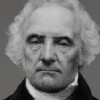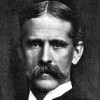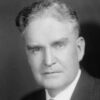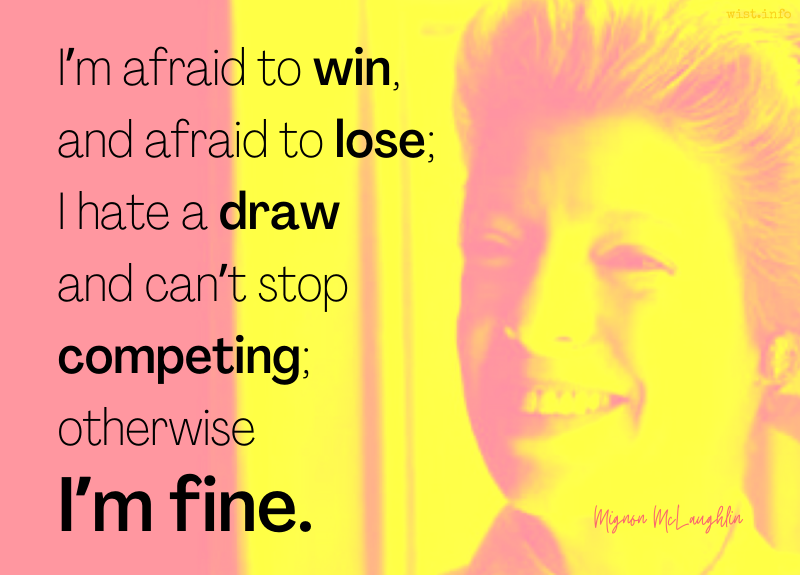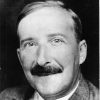I don’t believe any man ever existed without vanity, and if he did he would be an extremely uncomfortable person to have anything to do with. He would, of course, be a very good man, and we should respect him very much. He would be a very admirable man — a man to be put under a glass case and shown round as a specimen — a man to be stuck upon a pedestal and copied, like a school exercise — a man to be reverenced, but not a man to be loved, not a human brother whose hand we should care to grip. Angels may be very excellent sort of folk in their way, but we, poor mortals, in our present state, would probably find them precious slow company. Even mere good people are rather depressing.
Jerome K. Jerome (1859-1927) English writer, humorist [Jerome Klapka Jerome]
Idle Thoughts of an Idle Fellow, “On Vanity and Vanities” (1886)
(Source)
Quotations about:
ego
Note not all quotations have been tagged, so Search may find additional quotes on this topic.
We are afraid of having and showing a small mind, and we are not afraid of having and showing a small heart.
Joseph Joubert (1754-1824) French moralist, philosopher, essayist, poet
Pensées [Thoughts], 1805 entry [tr. Auster (1983)]
(Source)
I could not find an analog in other translations of the Pensées.
Pride plays a greater part than kindness in our censure of a neighbor’s faults. We criticize faults less to correct them, than to prove that we do not possess them.
[L’orgueil a plus de part que la bonté aux remontrances que nous faisons à ceux qui commettent des fautes; et nous ne les reprenons pas tant pour les en corriger que pour leur persuader que nous en sommes exempts.]
François VI, duc de La Rochefoucauld (1613-1680) French epigrammatist, memoirist, noble
Réflexions ou sentences et maximes morales [Reflections; or Sentences and Moral Maxims], ¶37 (1665-1678) [tr. Heard (1917)]
(Source)
Present from the first edition. (Source (French)). Alternate translations:
We are liberal of our remonstrances and reprehensions towards those, whom we think guilty of miscarriages; but we therein betray more pride, than charity. Our reproving them does not so much proceed from any desire in us of their reformation, as from an insinuation that we our selves are not chargeable with the like faults.
[tr. Davies (1669), ¶142]
Pride hath a greater share than Goodness in the reproofs we give other people for their faults; and we chide them, not so much with a design to mend them, as to make them believe that we ourselves are not guilty of them.
[tr. Stanhope (1694), ¶38]
Pride is more concerned than benevolence in our remonstrances to persons guilty of faults; and we reprove them not so much with a design to correct, as to make them believe that we ourselves are free from such failings.
[pub. Donaldson (1783), ¶349; ed. Lepoittevin-Lacroix (1797), ¶37]
In our reprehensions, pride has a greater share than good nature. We reprove, not so much in order to correct, as to intimate that we hold ourselves free from such failings.
[ed. Carville (1835), ¶309]
Pride has a greater share than goodness of heart in the remonstrances we make to those who are guilty of faults; we reprove not so much with a view to correct them as to persuade them that we are exempt from those faults ourselves.
[ed. Gowens (1851), ¶38]
Pride has a larger part than goodness in our remonstrances with those who commit faults, and we reprove them not so much to correct as to persuade them that we ourselves are free from faults.
[tr. Bund/Friswell (1871), ¶37]
Pride, rather than virtue, makes us reprove those who have done wrong; our reproaches are not so much intended to improve the evil-doer, as to show him that we are quite free of his taint.
[tr. FitzGibbon (1957), ¶37]
Pride plays a greater part than kindness in our remonstrating with those who make mistakes; and we point out their faults, less to correct them than to indicate they are not ours.
[tr. Kronenberger (1959), ¶37]
Pride plays a greater part than kindness in the reprimands we address to wrongdoers; we reprove them not so much to reform them as to make them believe that we are free from their faults.
[tr. Tancock (1959), ¶37]
Pride shares a greater part than the goodness of our hearts in the reprimands we give to those who commit faults; and we do not reprove so much in order to correct them, as in order to persuade them that we are ourselves exempt from those faults.
[tr. Whichello (2016), ¶37]
The fiercest fanatics are often selfish people who were forced, by innate shortcomings or external circumstances, to lose faith in their own selves. They separate the excellent instrument of their selfishness from their ineffectual selves and attach it to the service of some holy cause. And though it be a faith of love and humility they adopt, they can be neither loving nor humble.
Eric Hoffer (1902-1983) American writer, philosopher, longshoreman
True Believer: Thoughts on the Nature of Mass Movements, Part 2, ch. 7, § 38 (1951)
(Source)
Vanity is a weakness. I know this. It’s a shallow dependence on the exterior self, on how one looks instead of what one is. I know this well. But I have a scar the size and texture of a jellyfish on my abdomen already, and you’d be surprised how your sense of self changes when you can’t take your shirt off at the beach. In my more private moments, I pull up my shirt and look at it, tell myself it doesn’t matter, but every time a woman has felt it under her palm late at night, propped herself up on a pillow and asked me about it, I’ve made my explanation as quick as possible, closed the doors to my past as soon as they’ve opened, and not once, even when Angie’s asked, have I told the truth. Vanity and dishonesty may be vices, but they’re also the first forms of protection I ever knew.
Dennis Lehane (b. 1965) American novelist, screenwriter
A Drink Before the War, ch. 7 [Kenzie] (1996)
(Source)
No man is great if he thinks he is.
Some think they see their own hope to advance
tied to their neighbor’s fall, and thus they long
to see him cast down from his eminence;
Some fear their power, preferment, honor, fame
will suffer by another’s rise, and thus,
irked by his good, desire his ruin and shame;
And some at the least injury catch fire
and are consumed by thoughts of vengeance; thus,
their neighbor’s harm becomes their chief desire.
[E’ chi, per esser suo vicin soppresso,
spera eccellenza, e sol per questo brama
ch’el sia di sua grandezza in basso messo;
è chi podere, grazia, onore e fama
teme di perder perch’altri sormonti,
onde s’attrista sì che ’l contrario ama;
ed è chi per ingiuria par ch’aonti,
sì che si fa de la vendetta ghiotto,
e tal convien che ’l male altrui impronti.]Dante Alighieri (1265-1321) Italian poet
The Divine Comedy [Divina Commedia], Book 2 “Purgatorio,” Canto 17, l. 115ff (17.115-123) (1314) [tr. Ciardi (1961)]
(Source)
Virgil explains to Dante how "bad" love -- love for self, love of another's harm -- can manifest as Pride, Envy, or Wrath toward others, the sins addressed in the first three tiers of Purgatory.
(Source (Italian)). Alternate translations:
Those first the taints, that to their Neighbours' fall
Trust for distinction on this Earthly Ball,
In talents, wealth, or fame, and feed their pride
By the sad sight of others' hopes depress'd,
And o'er their ruin lift a lofty crest,
With Venom from the fount of Good supply'd.
The next that feel this sullen Stygian flame,
Are those, that fear to lose their wealth or fame,
Or any gift, by bounteous Heav'n assign'd;
And long possess'd of Fortune's turning wheel,
In its ascent another name reveal,
That threats to leave them, and their hopes behind.
Another evil thus becomes their good,
And feeds their black desires with Demon food. --
The third are they, who, with the sense of wrong,
Burn inward, or with fell, vindictive Wrath
Pursue their brethren to the Cave of Death,
By love of Pelf, or fiend-like Frenzy stung.
[tr. Boyd (1802), st. 28-30]
There is who hopes (his neighbour’s worth deprest,)
Preeminence himself, and coverts hence
For his own greatness that another fall.
There is who so much fears the loss of power,
Fame, favour, glory (should his fellow mount
Above him), and so sickens at the thought,
He loves their opposite: and there is he,
Whom wrong or insult seems to gall and shame
That he doth thirst for vengeance, and such needs
Must doat on other’s evil.
[tr. Cary (1814)]
There is, in order neighbour to suppress,
Who would excel, himself, his sole desire
Grandeur, that sees another in the mire:
There is who power, grace, and honour, fame,
Still fears to lose, because the rest surpass,
Grows sad, and loves the counteracting cause:
There is who, for injurious affront,
Revenge desires, thirsts for another's pain,
And hence to ill of others must attain.
[tr. Bannerman (1850)]
There are, who, by abasement of their neighbour,
Hope to excel, and therefore only long
That from his greatness he may be cast down;
There are, who power, grace, honour, and renown
Fear they may lose because another rises,
Thence are so sad that the reverse they love;
And there are those whom injury seems to chafe,
So that it makes them greedy for revenge,
And such must needs shape out another's harm.
[tr. Longfellow (1867)]
There is who, through his neighbour being kept down, hopes for excellence, and only for this reason yearns that he may be from his greatness brought low. There is who fears to lose power, grace, honour, and fame, in case another mounts up, wherefore he grows so sad that he loves the contrary. And there is who through injury appears so to take shame that he becomes gluttonous of vengeance; and such an one it behoves that he put forward another's ill.
[tr. Butler (1885)]
There is, who through his neighbour's ruin, so
Hopeth pre-eminence, who hence doth call
That he from grandeur may be cast down low.
There is, who fears to lose power, grace, and all
Honour and fame, because that others rise.
Which grieves him so that he desires their fall.
There is, who seems so hurt by injuries,
That he on vengeance greedily doth brood;
And such a one another's ill must prize.
[tr. Minchin (1885)]
There is he who hopes to excel through the abasement of his neighbor, and only longs that from his greatness he may be brought low. There is he who fears loss of power, favor, honor, fame, because another rises; whereat he is so saddened that he loves the opposite. And there is he who seems so outraged by injury that it makes him gluttonous of vengeance, and such a one must needs coin evil for others.
[tr. Norton (1892)]
There is he who through his neighbour's abasement hopes to excel, and solely for this desires that he be cast down from his greatness;
there is he who fears to lose power, favour, honour and fame because another is exalted, wherefore he groweth sad so that he loves the contrary;
and there is he who seems to be so shamed through being wronged, that he becomes greedy of vengeance, and such must needs seek another's hurt.
[tr. Okey (1901)]
There is he that hopes to excel by the abasement of his neighbour and for that sole reason longs that from his greatness he may be brought low; there is he that fears to lose power, favour, honour, and fame because another surpasses, by which he is so aggrieved that he loves the contrary; and there is he that feels himself so disgraced by insult that he becomes greedy of vengeance, and such a one must needs contrive another's harm.
[tr. Sinclair (1939)]
There is, who through his neighbour's overthrow
Hopes to excel, and only for that cause
Longs that he may from greatness be brought low.
There is, who fears power, favour, fame to lose
Because another mounts; wherefore his lot
So irks, he loves the opposite to choose.
And there is, who through injury grows so hot
From shame, with greed of vengeance he is burned,
And so must needs another's ill promote.
[tr. Binyon (1943)]
Some hope their neighbour’s ruin may divert
His glory to themselves, and this sole hope
Prompts them to drag his greatness in the dirt;
Some, in their fear to lose fame, favour, scope,
And honour, should another rise to power,
Wishing the worst, sit glumly there and mope;
And some there are whose wrongs have turned them sour,
So that they thirst for vengeance, and this passion
Fits them to plot some mischief any hour.
[tr. Sayers (1955)]
There is he that hopes to excel by the abasement of his neighbor, and solely for this desires that he be cast down from greatness.
There is he that fears to lose power, favor, honor, and fame, because another is exalted, by which he is so saddened that he loves the contrary.
And there is he who seems so outraged by injury that he becomes greedy of vengeance, and such a one must needs contrive another's hurt.
[tr. Singleton (1973)]
There is the man who sees his own success
connect to his neighbor's downfall; thus,
he longs to see him fall from eminence.
Next, he who fears to lose honor and fame,
power and favor, if his neighbor rise:
vexed by this good, he wishes for the words.
Finally, he who, wronged, flares up in rage:
with his great passion for revenge, he thinks
only of how to harm his fellow man.
[tr. Musa (1981)]
There is the man who, through the suppression of his neighbour,
Hopes to excel, and for that reason only
Desires to see him cast down from his greatness:
There is the man who fears to lose power, favour,
Honour and glory because of another’s success,
And so grieves for it that he loves the opposite:
And there is the man who takes umbrage at injury
So that he becomes greedy for revenge
And such a man must seek to harm another.
[tr. Sisson (1981)]
There’s he who, through abasement of another,
hopes for supremacy; he only longs
to see his neighbor’s excellence cast down.
Then there is one who, when he is outdone,
fears his own loss of fame, power, honor, favor;
his sadness loves misfortune for his neighbor.
And there is he who, over injury
received, resentful, for revenge grows greedy
and, angrily, seeks out another’s harm.
[tr. Mandelbaum (1982)]
There are those who hope for supremacy through their neighbor’s being kept down, and only on this account desire that his greatness be brought low;
there are those who fear to lose power, favor, honor, or fame because another mounts higher, and thus are so aggrieved that they love the contrary;
and there are those who seem so outraged by injury that they become greedy for revenge, and thus they must ready harm for others.
[tr. Durling (2003)]
There are those who hope to excel through their neighbour’s downfall, and because of this alone want them toppled from their greatness. This is Pride.
There are those who fear to lose, power, influence, fame or honour because another is preferred, at which they are so saddened they desire the contrary. This is Envy.
And there are those who seem so ashamed because of injury, that they become eager for revenge, and so are forced to wish another’s harm. This is Wrath.
[tr. Kline (2002)]
Some hope, by keeping all their neighbours down, that they'll excel. They yearn for that alone -- to see them brought from high to low estate.
Then, some will fear that, if another mounts, they'll lose all honour, fame and grace and power, so, grieving at success, love what it’s not.
And some, it seems, when hurt, bear such a grudge that they crave only to exact revenge -- which means they seek to speed another’s harm.
[tr. Kirkpatrick (2007)]
There is the one, hoping to excel by bringing down
his neighbor, who, for that sole reason, longs
that from his greatness his neighbor be brought low.
There is the one who fears the loss of power, favor,
honor, fame -- should he be bettered by another.
This so aggrieves him that he wants to see him fall.
And there is the one who thinks himself offended
and hungers after vengeance,
and he must then contrive another's harm.
[tr. Hollander/Hollander (2007)]
First, there's the man who aspires to excellence
By pressing down his neighbor: only this yearning
Makes him strive to pull his neighbor to the ground.
Then there's the man with power, favor, and honor,
And so afraid of losing these when someone
Climbs above him, that he hates what once he loved.
And there's the man who, outraged at being insulted,
Lusts for the chance of taking revenge, and rushes
Into wicked plans for hurting others.
[tr. Raffel (2010)]
COMMENDATION, n. The tribute that we pay to achievements that resemble, but do not equal, our own.
Ambrose Bierce (1842-1914?) American writer and journalist
“Commendation,” The Cynic’s Word Book (1906)
(Source)
Included in The Devil's Dictionary (1911). Originally published in the "Devil's Dictionary" column in the San Francisco Wasp (1881-08-05).
Compliments make me vain: & when I am vain, I am insolent & overbearing. It is a pity, too, because I love compliments. I love them even when they are not so. My child, I can live on a good compliment two weeks with nothing else to eat.
Mark Twain (1835-1910) American writer [pseud. of Samuel Clemens]
Letter to Gertrude Natkin (1906-03-02)
(Source)
In a similar vein, his biographer, Albert Bigelow Paine, in Mark Twain: A Biography, Vol. 4, ch. 250 (1912), recalled Clemens saying: "I can live for two months on a good compliment."
CONVERSATION, n. A fair for the display of the minor mental commodities, each exhibitor being too intent upon the arrangement of his own wares to observe those of his neighbor.
Ambrose Bierce (1842-1914?) American writer and journalist
“Conversation,” The Cynic’s Word Book (1906)
(Source)
Included in The Devil's Dictionary (1911). Originally published in the "Devil's Dictionary" column in the San Francisco Wasp (1881-08-26).
But why speak of others? Let me now return to myself.
[Sed quid ego alios? Ad me ipsum iam revertar.]
Marcus Tullius Cicero (106-43 BC) Roman orator, statesman, philosopher
De Senectute [Cato Maior; On Old Age], ch. 13 / sec. 45 (13.45) (44 BC) [tr. Falconer (1923)]
(Source)
(Source (Latin)). Alternate translations:
But it is not nede also to remembre in what thynges the othir olde men tokyn their honeste delectacyons. Therfor I shall come ayen to speke of myself.
[tr. Worcester/Worcester/Scrope (1481)]
But wherefore speak I so much of others? I will now returne to my selfe.
[tr. Austin (1648)]
But what have I to do with others, let me return now to myself.
[tr. J. D. (1744)]
But why should I quote others, and not rather return and speak of myself?
[tr. Logan (1744)]
But to pass from the practice of others to my own ....
[tr. Melmoth (1773)]
But why do I mention others? I will now return to myself.
[Cornish Bros. ed. (1847)]
But why do I refer to others? let me now return to myself.
[tr. Edmonds (1874)]
But why am I talking about others? I now return to my own case.
[tr. Peabody (1884)]
But why mention others? I will come back to my own case.
[tr. Shuckburgh (1895)]
Why speak of these?
Let's take myself.
[tr. Allison (1916)]
But enough of others -- let me return to myself!
[tr. Grant (1960, 1971 ed.)]
But why speak of other men? Let me revert to my own case.
[tr. Copley (1967)]
Enough of other people. Let me speak now of my own experience.
[tr. Cobbold (2012)]
But again I don't have to talk about the world famous. I can provide personal examples.
[tr. Gerberding (2014)]
I’ll now revert only to myself,
And put all the others on the shelf.
[tr. Bozzi (2015)]
Guard against that vanity which courts a compliment, or is fed by it.
Thomas Chalmers (1780-1847) Scottish minister, theologian, political economist, church leader
Journal (1810-05-10)
(Source)
We are of each an unsocial, taciturn disposition, unwilling to speak, unless we expect to say something that will amaze the whole room, and be handed down to posterity with all of the eclat of a proverb.
You have reached the pinnacle of success as soon as you become uninterested in money, compliments, or publicity.
Orlando A. Battista (1917-1995) Canadian-American chemist, aphorist
Quotoons: A Speaker’s Dictionary, No. 3962 (1977 ed.)
(Source)
Often misattributed to Thomas Wolfe. More discussion about the origin of quotation: You Have Reached the Pinnacle of Success as Soon as You Become Uninterested in Money, Compliments, or Publicity – Quote Investigator®.
The writer who considers only the taste of his own time is concerned more with his personal fame than with that of his books: we should always aim at perfection, and then we shall receive from posterity that justice which our contemporaries sometimes deny us.
[Celui qui n’a égard en écrivant qu’au goût de son siècle songe plus à sa personne qu’à ses écrits: il faut toujours tendre à la perfection, et alors cette justice qui nous est quelquefois refusée par nos contemporains, la postérité sait nous la rendre.]
Jean de La Bruyère (1645-1696) French essayist, moralist
The Characters [Les Caractères], ch. 1 “Of Works of the Mind [Des Ouvrages de l’Esprit],” § 67 (1.67) (1688) [tr. Stewart (1970)]
(Source)
(Source (French)). Alternate translations:
He who regards nothing more in his Works than the taste of the Age, has a greater value for his Person than his Writings: He should always aim at Perfection; and tho his Contemporaries refuse him Justice, Posterity will give it him.
[Bullord ed. (1696)]
He who regards nothing more in his Works than the Taste of his own Age, Considers his Person more than his Writings: He should always aim at Perfection, and tho his Contemporaries refuse him Justice, Posterity will give it him.
[Curll ed. (1713)]
He who regards nothing more in his Works than the Taste of the Age, has a greater value for his Person than his Writings: He should always aim at Perfection; and though his Cotempararies refuse him Justice, he will be better used by Posterity.
[Browne ed. (1752)]
He who only writes to suit the taste of the age, considers himself more than his writings. We should always aim at perfection, and then posterity will do us that justice which sometimes our contemporaries refuse.
[tr. Van Laun (1885)]
ADMIRABILITY, n. My kind of ability, as distinguished from your kind of ability.
Ambrose Bierce (1842-1914?) American writer and journalist
“Admirability,” The Cynic’s Word Book (1906)
(Source)
Not included in The Devil's Dictionary (1911). Originally published in the "Devil's Dictionary" column in the San Francisco Wasp (1881-05-12)
The way to a man’s heart is through his stomach, especially if you tell him how flat it is.
Mignon McLaughlin (1913-1983) American journalist and author
The Second Neurotic’s Notebook, ch. 3 (1966)
(Source)
And even when I reproach myself for it, the love of praise tempts me. There is temptation in the very process of self-reproach, for often, by priding himself on his contempt for vainglory, a man is guilty of even emptier pride; and for this reason his contempt of vainglory is an empty boast, because he cannot really hold it in contempt as long as he prides himself on doing so.
[[Amor laudis] temptat et cum a me in me arguitur, eo ipso quo arguitur, et saepe de ipso vanae gloriae contemptu vanius gloriatur, ideoque non iam de ipso contemptu gloriae gloriatur: non enim eam contemnit cum gloriatur.]
Augustine of Hippo (354-430) Christian church father, philosopher, saint [b. Aurelius Augustinus]
Confessions, Book 10, ch. 38 / ¶ 63 (10.38.63) (c. AD 398) [tr. Pine-Coffin (1961)]
(Source)
(Source (Latin)). Alternate translations:
[Love of praise] tempts, even when it is reproved by myself in myself, on the very ground that it is reproved; and often glories more vainly of the very contempt of vain-glory; and so it is no longer contempt of vain-glory, whereof it glories; for it doth not contemn when it glorieth.
[tr. Pusey (1838)]
[Love of praise] tempts, even when within I reprove myself for it, on the very ground that it is reproved; and often man glories more vainly of the very scorn of vain-glory; wherefore it is not any longer scorn of vain-glory whereof it glories, for he does not truly contemn it when he inwardly glories.
[tr. Pilkington (1876)]
[Love of praise] tempts, even when I condemn it in myself, and from the very fact that it is condemned; and often glories more vainly in the very contempt of vain-glory; and therefore it ceases to be contempt of vain-glory, whereof it glories; for it does not really contemn it when it so glories.
[tr. Hutchings (1890)]
Love of praise tempts me even when I reprove it in myself, indeed in the very fact that I do reprove it: a man often glories the more vainly for his very contempt of vainglory: for which reason he does not really glory in his contempt of glory; in that he glories in it, he does not contemn it.
[tr. Sheed (1943), 10.39]
[Love of praise] tempts me, even when I inwardly reprove myself for it, and this precisely because it is reproved. For a man may often glory vainly in the very scorn of vainglory--and in this case it is not any longer the scorn of vainglory in which he glories, for he does not truly despise it when he inwardly glories in it.
[tr. Outler (1955)]
Even when [love of praise] is rebuked within myself by myself, it affords temptation by the very fact that it is rebuked. Often, out of very contempt of glory a man derives an emptier glory. No longer, therefore, does he glory in contempt of vainglory: he does not despise it, in as much as he glories over it.
[tr. Ryan (1960)]
Indeed [the love of praise] tempts me even in the very act of condemning it; often in our contempt of vainglory we are merely being all the more vainglorious, and so one cannot really say that one glories in the contempt of glory; for one does not feel contempt for something in which one glories.
[tr. Warner (1963)]
[Love of praise] is a temptation, even when shown up by myself and in myself. "Shown up" is the right word. It often boasts emptily over its very scorn for empty boasting, which thus ceases to be the scorn of which it boasts. The boaster does not in truth despise it, when he boasts about it.
[tr. Blaiklock (1983)]
[Hankering for praise] is a real temptation to me, and even when I am accusing myself of it, the very fact that I am accusing myself tempts me to further self-esteem. We can make our very contempt for vainglory a ground for preening ourselves more vainly still, which proves that what we are congratulating ourselves on is certainly not contempt for vainglory; for no one who indulges in it can be despising it.
[tr. Boulding (1997)]
Modest egoism is the salt of conversation; you do not want too much of it, but if it is altogether omitted, everything tastes flat.
Henry Van Dyke (1852-1933) American clergyman and writer
“The Ristigouche from a Horse-Yacht,” Little Rivers (1895)
(Source)
Pride either finds a desert, or makes one; submission cannot tame its ferocity, nor satiety fill its voracity, and it requires very costly food — Its keeper’s happiness.
Charles Caleb "C. C." Colton (1780-1832) English cleric, writer, aphorist
Lacon: Or, Many Things in Few Words, Vol. 2, § 237 (1822)
(Source)
Ours is not the only story, just the most interesting one.
Mignon McLaughlin (1913-1983) American journalist and author
The Second Neurotic’s Notebook, ch. 4 (1966)
(Source)
To feasts and theatres you love to go
With men of rank and, when you chance to meet.
To lounge with them about a portico
Or street.
They let you bathe and dine with them, but what
Your dullard pride will never comprehend
Is that you are their mountebank, and not
Their friend.[Quod te diripiunt potentiores
Per convivia, porticus, theatra,
Et tecum, quotiens ita incidisti,
Gestari iuvat et iuvat lavari:
Nolito nimium tibi placere.
Delectas, Philomuse, non amaris.]Martial (AD c.39-c.103) Spanish Roman poet, satirist, epigrammatist [Marcus Valerius Martialis]
Epigrams [Epigrammata], Book 7, epigram 76 (7.76) (AD 92) [tr. Pott & Wright (1921), “The Toady”]
(Source)
(Source (Latin)). Alternate translations:
That great men court thee every where,
At feasts, and at the Theater,
And would, as oft as well may bee,
Walk, bathe, or take the ayre with thee;
Doe not admire thy selfe for it.
Tis not their love, but their delight.
[tr. May (1629), 7.75]
When dukes to town ask thee to dine,
To rule their roast, and smack their wine,
Or take thee to their country-seat,
To mark their dogs, and bless their meat,
Ah! dream not on preferment soon:
Thou'rt not their friend, but their buffoon.
[tr. Hoadley (fl. 18th C)]
All the great men take you away
To dinner, coffee-house, or play.
Nor happier are, than when you chance
To hunt with them, or take a dance.
Yet do not pride yourself too soon:
You're not a friend, but a buffoon.
[tr. Hay (1755)]
Thee the great may tear away
To the banquet, porch, or play;
And with thee may make their pride,
Or to talk, or bathe, or ride.
Yet thou may'st mistake with ease.
Thou delight'st; but dost not please.
[tr. Elphinston (1782), Book 7, ep. 4]
That men of rank take you along with them almost by force to their banquets, to porticos, and theatres; and that when they meet you they have pleasure in carrying you in their vehicles, and going along with you to the same baths; -- let not this puff you up with self-satisfaction, Philomusus; all this is because you are entertaining, not because you are beloved.
[tr. Amos (1858)]
Though the great hurry you off to their banquets, and walks in the porticoes, and to the theatres; and though they are delighted, whenever you meet them, to make you share their litters, and to bathe with you, do not be too vain of such attentions. You entertain them, Philomusus; you are not an object of their regard.
[tr. Bohn's Classical (1859)]
Because men of influence vie in hurrying you off to entertainments, colonnades, theatres, and enjoy, whenever you happen to meet them, being carried in litters with you and enjoy bathing with you, by no means fancy yourself too much. You entertain them, Philomusus, you are not loved.
[tr. Ker (1919)]
If important people compete for your company at dinner tables an din the colonnades and theaters and like to ride with you and bathe with you as often as you turn up, don't get too conceited. It's your company they like, Philomusus, not you.
[tr. Shackleton Bailey (1993): literally, "you give them pleasure, you are not loved."]
The rich folk ask you out to dine,
Or ride with them, or drink their wine,
Or take a bath, or just hang out --
Now Philomusus, please don't pout --
You only entertain their crew:
They're really not so into you.
[tr. Ericsson (1995)]
If powerful men take you up,
at meals, theatres, and porticos,
like riding and bathing with you,
wherever you happen to go,
don’t be too proud, Philomusus:
you give pleasure, it isn’t love.
[tr. Kline (2006), "The Reality"]
If powerful men -- at banquets, porticoes,
and plays -- compete to have you by their side;
if every time they meet you, they’re delighted
to offer you a hot bath or a ride;
don’t get too vain about it, Philomusus.
They love not you, but pleasure you provide.
[tr. McLean (2014)]
See Ben Jonson, "To Mime," which ends, "Men love thee not for this: They laugh at thee."
When a man boasts, it is an indication he holds his listener in higher esteem than he does himself.
Marcelene Cox (1900-1998) American writer, columnist, aphorist
“Ask Any Woman” column, Ladies’ Home Journal (1955-06)
(Source)
Princes like to be helped, but not surpassed. When you counsel someone, you should appear to be reminding him of something he had forgotten, not of the light he was unable to see.
[Gustan de ser ayudados los príncipes, pero no excedidos, y que el aviso haga antes viso de recuerdo de lo que olvidaba que de luz de lo que no alcanzó.]
Baltasar Gracián y Morales (1601-1658) Spanish Jesuit priest, writer, philosopher
The Art of Worldly Wisdom [Oráculo Manual y Arte de Prudencia], § 7 (1647) [tr. Maurer (1992)]
(Source)
(Source (Spanish)). Alternate translations:
Princes are willing to be assisted, but not surpassed. Those who advise them ought to speak as if they put them in mind of what they forgot, and not as teaching them what they knew not.
[Flesher ed. (1685)]
They [princes] will allow a man to help them but not to surpass them, and will have any advice tendered them appear like a recollection of something they have forgotten rather than as a guide to something they cannot find.
[tr. Jacobs (1892)]
They [kings] may abide being helped, but not surpassed, wherefore let advice given them appear more a jog to what they forgot, than a light to what they could not find.
[tr. Fischer (1937)]
If you have the privilege of a fine education, well, you have it because somebody made it possible. If you have the privilege to gain wealth and a bit of the world’s goods, well, you have it because somebody made it possible. So don’t boast, don’t be arrogant.
Martin Luther King, Jr. (1929-1968) American clergyman, civil rights leader, social activist, preacher
“Conquering Self-Centeredness,” sermon, Dexter Ave. Baptist Church, Montgomery (11 Aug 1957)
(Source)
Violent zeal for truth has a hundred to one odds to be either petulancy, ambition, or pride.
We alone are right-minded; everyone else is wrong.
[μόνοι γὰρ εὖ φρονοῦμεν, οἱ δ᾽ ἄλλοι κακῶς.]
Euripides (485?-406? BC) Greek tragic dramatist
Bacchæ [Βάκχαι], l. 196 [Teiresias/Τειρεσίας] (405 BC) [tr. Robinson (2014)]
(Source)
When asked by Cadmus about being the only men of Thebes attending the Bacchanal. (Source (Greek)). Alternate translation:
Because ourselves alone
Are truly wise, but others judge amiss.
[tr. Wodhull (1809)]
Yes, for we alone think rightly, the rest wrongly.
[tr. Buckley (1850)]
All else misjudge; we only are the wise.
[tr. Milman (1865)]
Alone: For we are wise, the rest are fools.
[tr. Rogers (1872), l. 179]
Yea, for we alone are wise, the rest are mad.
[tr. Coleridge (1891)]
Yea, we alone are wise; the rest be fools.
[tr. Way (1898)]
Aye, Thebes is blinded. Thou and I can see.
[tr. Murray (1902)]
They are all blind.
Only we can see.
[tr. Arrowsmith (1960)]
Yes, for only we are sane -- the rest are mad.
[tr. Kirk (1970)]
We are the only men right-minded; the rest are perverse.
[tr. Vellacott (1973)]
We alone think well, the others ill.
[tr. Neuburg (1988)]
The only ones with healthy minds. The rest are sick.
[tr. Cacoyannis (1982)]
Only we think right. The others vilely.
[tr. Blessington (1993)]
Yes, since only we reason well. The rest are fools!
[tr. Esposito (1998)]
The only ones in our right minds. The rest are mad.
[tr. Woodruff (1999)]
Yes, only we have any sense, the rest have none.
[tr. Gibbons/Segal (2000)]
Yes, we alone have sense, the others none.
[tr. Kovacs (2002)]
Yes, Kadmos because we are the only ones who can think straight. The rest of them? They are all wrong!
[tr. Theodoridis (2005)]
We alone've got it right; the others, wrongly.
[tr. Valerie (2005)]
Yes, indeed,
for we're the only ones whose minds are clear.
As for the others, well, their thinking's wrong.
[tr. Johnston (2008), l. 247ff]
The rest are blind. Only we can see.
[tr. Robertson (2014)]
We’re the only ones wise enough. The rest ... less so.
[tr. Pauly (2019)]
Of course; no one else has enough sense.
[tr. Behr/Foster (2019)]
We alone are sensible, all the others foolish.
[tr. Buckley/Sens/Nagy (2020)]
We never get anywhere in this world without the forces of history and individual persons in the background helping us to get there.
Martin Luther King, Jr. (1929-1968) American clergyman, civil rights leader, social activist, preacher
“Conquering Self-Centeredness,” sermon, Dexter Ave. Baptist Church, Montgomery, Ala. (11 Aug 1957)
(Source)
We long for self-confidence, till we look at the people who have it.
Mignon McLaughlin (1913-1983) American journalist and author
The Neurotic’s Notebook, ch. 4 (1963)
(Source)
All of us are infected today with an extraordinary egoism. And that is not freedom; freedom means learning to demand only of oneself, not of life and others, and knowing how to give: sacrifice in the name of love.
Andrei Tarkovsky (1932-1986) Russian film director, screenwriter, film theorist [Андрей Арсеньевич Тарковский]
Sculpting in Time (1986) [tr. Hunter-Blair]
(Source)
A good scientist is a person with original ideas. A good engineer is a person who makes a design that works with as few original ideas as possible. There are no prima donnas in engineering.
Freeman Dyson (1923-2020) English-American theoretical physicist, mathematician, futurist
Disturbing the Universe, ch. 10 (1979)
(Source)
There are some who turn everything into warfare, who behave like social bandits and would like to conquer others in everything they do. They have no idea how to live peaceably.
[Hay algunos que todo lo reducen a guerrilla; bandoleros del trato, cuanto ejecutan querrían que fuese vencimiento, no saben proceder pacíficamente.]
Baltasar Gracián y Morales (1601-1658) Spanish Jesuit priest, writer, philosopher
The Art of Worldly Wisdom [Oráculo Manual y Arte de Prudencia], § 218 (1647) [tr. Maurer (1992)]
(Source)
(Source (Spanish)). Alternate translations:
There are some who turn every thing into a kind of skirmishing. They are Ruffians in Conversation; and would make a triumph of every thing they doe. They know not what it is to be peacefull.
[Flesher ed. (1685)]
There are persons who make a war out of everything, real banditti of intercourse. All that they undertake must end in victory; they do not know how to get on in peace.
[tr. Jacobs (1892)]
There are those who reduce everything to war, veritable highwaymen of friendly intercourse; they seek that all they push through be made a victory; and they know not peaceful pursuit.
[tr. Fischer (1937)]
Almost any dog thinks almost any human is the Great Spirit, the Primal Creator, and the Universal Force Behind the Sun and Tides. What human can resist?
There were four things the Master abstained from entirely: he did not speculate, he did not claim or demand certainty, he was not inflexible, and he was not self-absorbed.
[子絕四、毋意、毋必、毋固、毋我]
Confucius (c. 551- c. 479 BC) Chinese philosopher, sage, politician [孔夫子 (Kǒng Fūzǐ, K'ung Fu-tzu, K'ung Fu Tse), 孔子 (Kǒngzǐ, Chungni), 孔丘 (Kǒng Qiū, K'ung Ch'iu)]
The Analects [論語, 论语, Lúnyǔ], Book 9, verse 4 (9.4) (6th C. BC – 3rd C. AD) [tr. Ames/Rosemont (1998)]
(Source)
Different versions of the Analects take these four items in slightly differing order, reflected in the translations below. (Source (Chinese)). Alternate translations:
There were four things from which the Master was entirely free. He had no foregone conclusions, no arbitrary predeterminations, no obstinacy, and no egoism.
[tr. Legge (1861)]
The Master barred four (words); - he would have no "shall"s, no "must"s, no "certainly"s, no "I"s.
[tr. Jennings (1895)]
There were four things from which Confucius was entirely free : He was free from self-interest, from prepossessions, from bigotry and from egoism.
[tr. Ku Hung-Ming (1898)]
The Master was entirely free from four things: he had no preconceptions, no pre-determinations, no obduracy, and no egoism.
[tr. Soothill (1910)]
He was cut off from four things; he had no prejudices, no categoric imperatives, no obstinacy or no obstinate residues, no time-lags, no egotism.
[tr. Pound (1933); yes, that looks to be five things]
There are four things that the Master wholly eschewed: he took nothing for granted, he was never over-positive, never obstinate, never egotistic.
[tr. Waley (1938)]
The Master recognized four prohibitions; Do not be swayed by personal opinion; recognize no inescapable necessity; do not be stubborn; do not be egotistic.
[tr. Ware (1950)]
He denounced (or tried to avoid completely) four things: arbitrariness of opinions, dogmatism, narrow-mindedness and egotism.
[tr. Lin Yutang (1938)]
There were four things the Master refused to have anything to do with: he refused to entertain conjectures or insist on certainty; he refused to be inflexible or to be egotistical.
[tr. Lau (1979)]
The Master cut out four things. He never took anything for granted, he never insisted on certainty, he was never inflexible and never egotistical.
[tr. Dawson (1993)]
The Master absolutely eschewed four things: capriciousness, dogmatism, willfulness, self-importance.
[tr. Leys (1997)]
The Master was absolutely free from four things: free from conjecture, free from arbitrariness, free from obstinacy, free from egoism.
[tr. Huang (1997)]
Confucius prohibited the four points: no wantonness, no dictatorship, no stubbornness, and no arrogance.
[tr. Cai/Yu (1998)]
The Master avoided four things: no wish, no will, no set, no self.
[tr. Brooks/Brooks (1998); they further interpret, "no fixed opinions, no foregone conclusions, no stubbornness, no self-absorption"]
The Master had freed himself of four things: idle speculation, certainty, inflexibility, and conceit.
[tr. Hinton (1998)]
The Master observed four prohibitions: no willfulness, no obstinacy, no narrow-mindedness, no egotism.
[tr. Watson (2007)]
The Master stayed away from four things: he did not put forth theories or conjectures; he did not think he must be right; he was not obdurate; he was not self-centered.
[tr. Annping Chin (2014)]
Confucius has four ultimate mindsets for perfect: no prejudice, no absolute must, no fixation, no self.
[tr. Li (2020)]
If only men could be depended upon to base their decisions on reason. Alas, there are only three or four of us in the world, and even we will bear watching.
Little men would be discouraged if they could see themselves in their true light. So conceit was sent into the world — God’s great gift to little men.
Bruce Barton (1886-1967) American author, advertising executive, politician
“The Gift to Little Men” (1926)
(Source)
Often paraphrased, "Conceit is God's gift to little men."
To suppose that God Almighty has confined his goodness to this world, to the exclusion of all others, is much similar to the idle fancies of some individuals in this world, that they, and those of their communion or faith, are the favorites of heaven exclusively; but these are narrow and bigoted conceptions, which are degrading to a rational nature, and utterly unworthy of God, of whom we should form the most exalted ideas.
Ethan Allen (1738-1789) American businessman, land speculator, revolutionary, writer
Reason, the Only Oracle of Man, ch. 2 sec. 7 (1782)
(Source)
You’re rich and young, as all confess,
And none denies your loveliness;
But when we hear your boastful tongue
You’re neither pretty, rich, nor young.[Bella es, novimus, et puella, verum est,
Et dives, quis enim potest negare?
Sed cum te nimium, Fabulla, laudas,
Nec dives neque bella nec puella es.]Martial (AD c.39-c.103) Spanish Roman poet, satirist, epigrammatist [Marcus Valerius Martialis]
Epigrams [Epigrammata], Book 1, epigram 64 (1.64) (AD 85-86) [tr. Pott & Wright (1921), “The Boaster”]
(Source)
"To Fabulla." (Source (Latin)). Alternate translations:
Of beautie braue we knowe thou art,
and eke a maide beside:
Abounding eke in wealthe and store,
this ne maie bee denied.
But while to much you praise your self,
and boste you all surmount:
Ne riche, ne faire, Fabulla, nor
A maide we can you counte.
[tr. Kendall (1577)]
You're fayre, I know't; and modest too, 't is true;
And rich you are; well, who denyes it you?
But whilst your owne prayse you too much proclame,
Of modest, rich, and fayre you loose the same.
[17th C Manuscript]
Faire, rich, and yong? how rare is her perfection,
Were it not mingled with one soule infection?
I meane, so proud a heart, so curst a tongue,
As makes her seeme, nor faire, nor rich, nor yong.
[tr. Harington (fl. c. 1600), ep. 291; Book 4, ep. 37 "Of a faire Shrew"]
Th' art faire Fabulla, tis most true,
Rich, yongue, there's none denies thy due.
But whilest thy selfe dost too much boast,
Thy youth, thy wealth, thy beautie's lost.
[tr. May (1629)]
Genteel 't is true, O nymph, you are;
You're rich and beauteous to a hair.
But while too much you praise yourself,
You've neither air, nor charms, nor pelf.
[tr. Gent. Mag. (1746)]
Pretty thou art, we know; a pretty maid!
A rich one, too, it cannot be gainsay'd.
But when thy puffs we hear, thy pride we see;
Thou neither rich, nor fair, nor maid canst be.
[tr. Elphinston (1782), Book 6, Part 3, ep. 48; Bohn labels this as Anon.]
You are pretty, -- we know it; and young, --it is true; and rich, -- who can deny it? But when you praise yourself extravagantly, Fabulla, you appear neither rich, nor pretty, nor young.
[tr. Bohn's Classical (1859)]
Fabulla, it's true you're a fair ingénue,
And your wealth is on every one's tongue:
But your loud self-conceit
Makes people you meet
Think you neither fair, wealthy, nor young.
[tr. Nixon (1911), "The Egoist"]
You are beautiful, we know, and young, that is true, and rich -- for who can deny it? But while you praise yourself overmuch, Fabulla, you are neither rich, nor beautiful, nor young.
[tr. Ker (1919)]
You’re beautiful, oh yes, and young, and rich;
But since you tell us so, you’re just a bitch.
[tr. Humphries (1963)]
It's true enough, Fabulla, you are
by you, Fabulla, you aren't rich, or beautiful, or young.
Bovie (1970)]
That you're young, beautiful and rich,
Fabulla, no one can deny.
But when you praise yourself too much,
None of the epithets apply.
[tr. Michie (1972)]
You're beautiful, oh yes, and young, and rich;
But since you tell us so, you're just a bitch.
[tr. Humphries (<1987)]
You are pretty: we know. You are young: true. And rich: who can deny it? But when you praise yourself too much, Fabulla, you are neither rich nor pretty nor young.
[tr. Shackleton Bailey (1993)]
You're rich, and young, and beautiful!
It's true, and who can doubt it?
But less and less we feel that pull
The more you talk about it.
[tr. Ericsson (1995)]
Of debutantes you are beyond compare --
So wealthy, beautiful, and debonair.
Yet you make all this matter not a whit:
Your beauty to undo -- you boast of it.
[tr. Wills (2007)]
You’re lovely, yes, and young, it’s true,
and rich -- who can deny your wealth?
But you aren’t lovely, young or rich,
Fabulla, when you praise yourself.
[tr. McLean (2014)]
Our profession is dreadful, writing corrupts the soul. Every author is surrounded by an aura of adulation which he nurses so assiduously that he cannot begin to judge his own worth or see when it starts to decline.
Leo Tolstoy (1828-1910) Russian novelist and moral philosopher
Letter to Nikolay Strakhov (1876)
(Source)
Quoted in Henri Troyat, Tolstoy (1967).
Every author, however modest, keeps a most outrageous vanity chained like a madman in the padded cell of his breast.
Logan Pearsall Smith (1865-1946) American-English essayist, editor, anthologist
Afterthoughts (1931)
(Source)
An author, like any other so-called artist, is a man in whom the normal vanity of all men is so vastly exaggerated that he finds it a sheer impossibility to hold it in. His overpowering impulse is to gyrate before his fellow men, flapping his wings and emitting defiant yells. This being forbidden by the police of all civilized countries, he takes it out by putting his yells on paper. Such is the thing called self-expression.
H. L. Mencken (1880-1956) American writer and journalist [Henry Lewis Mencken]
“The Fringes of Lovely Letters,” Prejudices: Fifth Series (1926)
(Source)
His mistaken belief in his own superiority cut him off from reality as completely as if he were living in a colored glass jar.
Precisely in trifles, wherein a man is off his guard, does he show his character, and then we are often able at our leisure to observe in small actions or mere mannerisms the boundless egoism which has not the slightest regard for others and in matters of importance does not afterwards deny itself, although it is disguised. We should never miss such an opportunity. If in the petty affairs and circumstances of everyday life, in the things to which the de minimis lex non curat applies, a man acts inconsiderately, seeking merely his own advantage or convenience to the disadvantage of others; if he appropriates that which exists for everybody; then we may be sure that there is no justice in his heart, but that he would be a scoundrel even on a large scale if his hands were not tied by law and authority; we should not trust him across our threshold. Indeed, whoever boldly breaks the laws of his own circle will also break those of the State whenever he can do so without risk.
[Gerade in Kleinigkeiten, als bei welchen der Mensch sich nicht zusammennimmt, zeigt er seinen Charakter, und da kann man oft, an geringfügigen Handlungen, an bloßen Manieren, den gränzenlosen, nicht die mindeste Rücksicht auf Andere kennenden Egoismus bequem beobachten, der sich nachher im Großen nicht verleugnet, wiewohl verlarvt. Und man versäume solche Gelegenheit nicht. Wenn Einer in dem kleinen täglichen Vorgängen und Verhältnissen des Lebens, in den Dingen, von welchen das de minimis lex non curat gilt, rücksichtslos verfährt, bloß seinen Vertheil oder seine Bequemlichkeit, zum Nachtheil Andere, sucht; wenn er sich angeignet was für Alle da ist u. s. w.; da sei man überzeugt, daß in seinem Herzen keine Gerechtigkeit wohnt, sondern er auch im Großen ein Schuft sein wird, sobald das Gesetz und die Gewalt ihm nicht die Hände binden, und traue ihm nicht über die Schwelle. Ja, wer ohne Scheu die Gesetze seines Klubs bricht, wird auch die des Staates brechen, sobald er es ohne Gefahr kann.]
Arthur Schopenhauer (1788-1860) German philosopher
Parerga and Paralipomena, Vol. 1, “Aphorisms on the Wisdom of Life [Aphorismen zur Lebensweisheit],” ch. 4 “Counsels and Maxims [Paränesen und Maximen],” § 3.29 (1851) [tr. Payne (1974)]
(Source)
The Latin means, "The law is not concerned with trifles." (Source (German)) Alternate translations:
A man shows his character just in the way in which he deals with trifles, -- for then he is off his guard. This will often afford a good opportunity of observing the boundless egoism of man's nature, and his total lack of consideration for others; and if these defects show themselves in small things, or merely in his general demeanor, you will find that they also underlie his action in matters of importance, although he may disguise the fact. This is an opportunity which should not be missed. If in the little affairs of every day, -- the trifles of life, those matters to which the rule de minimis non applies, -- a man is inconsiderate and seeks only what is advantageous or convenient to himself, to the prejudice of others' rights; if he appropriates to himself that which belongs to all alike, you may be sure there is no justice in his heart, and that he would be a scoundrel on a wholesale scale, only that law and compulsion bind his hands. Do not trust him beyond your door. He who is not afraid to break the laws of his own private circle, will break those of the State when he can do so with impunity.
[tr. Saunders (1890)]
Men best show their character in trifles, where they are not on their guard. It is in insignificant matters, and in the simplest habits, that we often see the boundless egotism which pays no regard to the feeling of others, and denies nothing to itself.
[In Tryon Edwards, A Dictionary of Thoughts, "Character" (1891); this is the version quoted most often.]
The mistakes I made from weakness do not embarrass me nearly so much as those I made insisting on my strength.
James Richardson (b. 1950) American poet
“Vectors: 56 Aphorisms and Ten-second Essays,” Michigan Quarterly Review, #27 (Spring 1999)
(Source)
So many times I’ve made myself stupid with the fear of being outsmarted.
James Richardson (b. 1950) American poet
“Vectors: 56 Aphorisms and Ten-second Essays,” Michigan Quarterly Review, #17 (Spring 1999)
(Source)
The problem is, many of the people in need of saving are in churches, and at least part of what they need saving from is the idea that God sees the world the same way they do.
Barbara Brown Taylor (b. 1951) American minister, academic, author
An Altar in the World, ch. 2 (2009)
(Source)
When a man boasted in his presence that he was a native of an illustrious city, he said, “That is not what one ought to look at, but whether one is worthy of a great city.”
[πρὸς τὸν καυχώμενον ὡς ἀπὸ μεγάλης πόλεως εἴη, “οὐ τοῦτο,” ἔφη, “δεῖ σκοπεῖν, ἀλλ᾽ ὅστις μεγάλης πατρίδος ἄξιός ἐστιν.”]
Aristotle (384-322 BC) Greek philosopher
Attributed in Diogenes Laërtius, Lives and Opinions of Eminent Philosophers [Vitae Philosophorum], Book 5, sec. 11 [tr. Yonge (1853)]
(Source)
(Source (Greek)). Alternate translations:
To one who boasted that he belonged to a great city his reply was, "That is not the point to consider, but who it is that is worthy of a great country."
[tr. Hicks (1925), sec. 19]
To a man boasting that he was from a great city, he said “Don’t look at this, but instead who is worthy of a great country.”
[tr. @sentantiq (2016)]
To someone who boasted that he came from a great city, he said, "That is not what one should consider, but who it is that is worthy of a great country."
[tr. Mensch (2018)]
Just as most soldiers believe bullets will hit only others, not themselves, most citizens like to think that their own minds and thought processes are invulnerable. “Other people can be manipulated, but not me,” they declare. People like to think that their opinions, values and ideas are inviolate and totally self-regulated. They may admit grudgingly that they are influenced slightly by advertising. Beyond that, they want to preserve a myth in which other persons are weak-minded and easily influenced, but they are strong-minded.
Margaret Singer (1921-2003) American clinical psychologist and researcher
“The ‘Not Me’ Myth: Orwell and the Mind,” Idea (19 Jan 1996)
(Source)
I’m afraid to win, and afraid to lose; I hate a draw and can’t stop competing; otherwise I’m fine.
Mignon McLaughlin (1913-1983) American journalist and author
The Neurotic’s Notebook, ch. 4 (1963)
(Source)
What egotism, what stupid vanity, to suppose that a thing could not happen because you could not conceive it!
Under normal circumstances, the name a human being bears is no more than the band is to a cigar: a means of identification, a superficial, almost unimportant thing that is only loosely related to the real subject, the true ego. In the event of a success the name begins to swell, so to say. It loosens itself from the human being that bears it and becomes a power in itself, a force, an independent thing, an article of commerce, a capital asset; and psychologically again with strong reaction it becomes a force which tends to influence, to dominate, to transform the person who bears it.
Stefan Zweig (1881-1942) Austrian novelist, playwright, journalist, biographer
The World of Yesterday [Die Welt von Gestern], ch. 13 (1942)
(Source)











